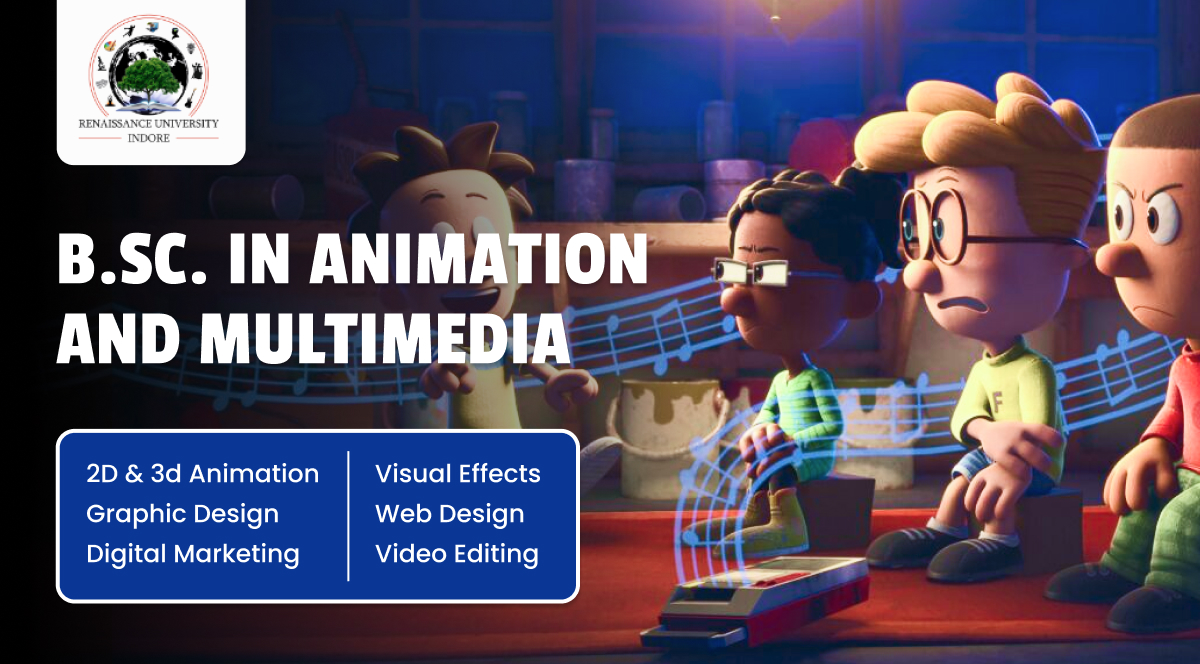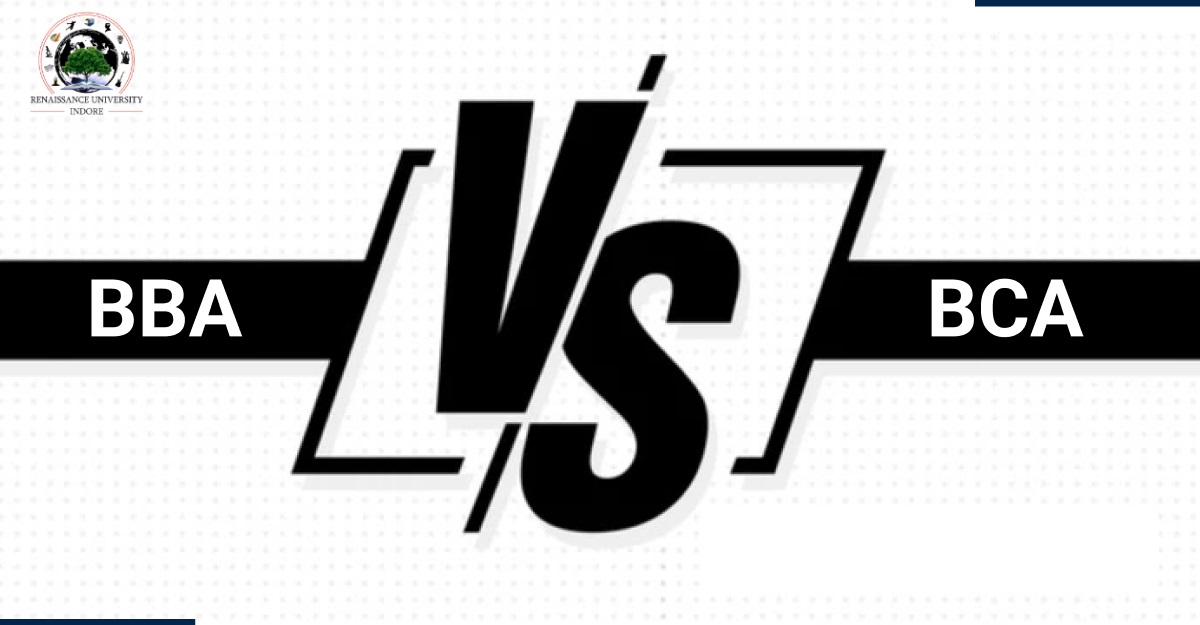Introduction
Course Curriculum
B.Sc in Animation and Multimedia is a 3-year undergraduate degree program that focuses on various aspects of animation and multimedia, including 2D and 3D animation, digital art and design, storyboarding, character design and development, visual effects, motion graphics, interactive media, game design and development, and sound and video editing.
The core courses of the curriculum include:
- 2D and 3D Animation: This course teaches students the principles of animation, including timing, spacing, and squash and stretch. Students will learn how to create hand-drawn and computer-generated animations.
- Digital Art and Design: In this course, students will learn how to create digital art using software such as Adobe Photoshop and Illustrator. They will learn techniques such as color theory, composition, and typography.
- Storyboarding: Students will learn how to create storyboards, which are a series of illustrations used to plan out a movie or animation. This course will cover the principles of storyboarding, such as camera angles, shot composition, and pacing.
- Character Design and Development: This course teaches students how to create and develop characters for movies, animations, and games. Students will learn how to create character sheets, which include information about a character’s appearance, personality, and backstory.
- Visual Effects: Students will learn how to create visual effects using software such as Adobe After Effects and Autodesk Maya. They will learn techniques such as compositing, color grading, and particle effects.
- Motion Graphics: In this course, students will learn how to create motion graphics, which are animated graphic designs used in movies, TV shows, and advertisements. Students will learn how to use software such as Adobe Premiere Pro and After Effects.
- Interactive Media: This course teaches students how to create interactive media such as websites, mobile apps, and games. Students will learn programming languages such as HTML, CSS, and JavaScript.
- Game Design and Development: In this course, students will learn how to create video games using software such as Unity and Unreal Engine. They will learn how to design game mechanics, create assets, and program game logic.
- Sound and Video Editing: This course teaches students how to edit sound and video using software such as Adobe Audition and Premiere Pro. They will learn techniques such as syncing audio and video, adding sound effects, and color grading.
In addition to the core courses, students may choose from a range of elective courses, such as UI/UX design, mobile app development, web design and development, augmented reality, virtual reality, artificial intelligence, and machine learning in animation. The curriculum also includes opportunities for internships and a capstone project, where students can apply their skills to a real-world project.
The curriculum of B.Sc in Animation and Multimedia is designed to provide students with a comprehensive understanding of the various aspects of animation and multimedia and equip them with the technical and creative skills needed to succeed in the industry.
Career Opportunities
B.Sc in Animation and Multimedia opens up a wide range of career opportunities for graduates. Here are some of the career options:
- 2D and 3D Animator: Animators create animations for movies, TV shows, video games, and advertisements. They use software such as Autodesk Maya, Adobe Animate, and Toon Boom Harmony to create 2D and 3D animations.
- Character Designer: Character designers create and develop characters for movies, animations, and video games. They work closely with writers and directors to ensure that the characters are consistent with the story and are appealing to the audience.
- Storyboard Artist: Storyboard artists create storyboards, which are a series of illustrations used to plan out a movie or animation. They work closely with directors and writers to visualize the story and create a roadmap for the production team.
- Visual Effects Artist: Visual effects artists create special effects for movies, TV shows, and advertisements. They use software such as Adobe After Effects, Nuke, and Houdini to create effects such as explosions, fire, and water.
- Motion Graphics Artist: Motion graphics artists create animated graphic designs used in movies, TV shows, and advertisements. They use software such as Adobe Premiere Pro and After Effects to create animations that convey information and enhance the visual appeal of the project.
- Game Designer and Developer: Game designers and developers create video games for consoles, PCs, and mobile devices. They work on various aspects of game development, such as game mechanics, level design, programming, and testing.
- Sound and Video Editor: Sound and video editors edit sound and video for movies, TV shows, and advertisements. They use software like Adobe Audition, Premiere Pro, and Avid Media Composer to edit and enhance sound and video.
- UI/UX Designer: UI/UX designers create user interfaces and experiences for websites, mobile apps, and software applications. They work on aspects such as layout, navigation, and user flow to create interfaces that are easy to use and visually appealing.
- Digital Marketer: Digital marketers use their knowledge of animation and multimedia to create compelling digital marketing campaigns. They work on aspects such as social media marketing, email marketing, and content marketing to promote products and services.
B.Sc in Animation and Multimedia offers graduates a range of exciting career opportunities in various fields such as entertainment, advertising, education, and technology.
- 2D and 3D Animator: Animators create animations for movies, TV shows, video games, and advertisements. They use software such as Autodesk Maya, Adobe Animate, and Toon Boom Harmony to create 2D and 3D animations.
- Character Designer: Character designers create and develop characters for movies, animations, and video games. They work closely with writers and directors to ensure that the characters are consistent with the story and are appealing to the audience.
- Storyboard Artist: Storyboard artists create storyboards, which are a series of illustrations used to plan out a movie or animation. They work closely with directors and writers to visualize the story and create a roadmap for the production team.
- Visual Effects Artist: Visual effects artists create special effects for movies, TV shows, and advertisements. They use software such as Adobe After Effects, Nuke, and Houdini to create effects such as explosions, fire, and water.
- Motion Graphics Artist: Motion graphics artists create animated graphic designs used in movies, TV shows, and advertisements. They use software such as Adobe Premiere Pro and After Effects to create animations that convey information and enhance the visual appeal of the project.
- Game Designer and Developer: Game designers and developers create video games for consoles, PCs, and mobile devices. They work on various aspects of game development, such as game mechanics, level design, programming, and testing.
- Sound and Video Editor: Sound and video editors edit sound and video for movies, TV shows, and advertisements. They use software like Adobe Audition, Premiere Pro, and Avid Media Composer to edit and enhance sound and video.
- UI/UX Designer: UI/UX designers create user interfaces and experiences for websites, mobile apps, and software applications. They work on aspects such as layout, navigation, and user flow to create interfaces that are easy to use and visually appealing.
- Digital Marketer: Digital marketers use their knowledge of animation and multimedia to create compelling digital marketing campaigns. They work on aspects such as social media marketing, email marketing, and content marketing to promote products and services. B.Sc in Animation and Multimedia offers graduates a range of exciting career opportunities in various fields such as entertainment, advertising, education, and technology.
Benefits of Pursuing a B.Sc in Animation and Multimedia
Pursuing a B.Sc in Animation and Multimedia has several benefits, including:
- Skill development: The course provides an opportunity to develop a range of technical and creative skills required in the field of animation and multimedia. Students learn to use software such as Adobe Photoshop, Maya, and After Effects to create 2D and 3D animations, special effects, and visual designs.
- Versatile career options: Graduates can choose from a wide range of career options such as 2D and 3D animators, character designers, motion graphics artists, and game developers. The skills learned in the course can also be applied to other fields such as graphic design, web design, and digital marketing.
- High demand for skilled professionals: The animation and multimedia industry is growing rapidly, with a high demand for skilled professionals. The course provides graduates with the knowledge and skills required to meet the industry’s demands.
- Creative outlet: Animation and multimedia is a highly creative fields, and pursuing a B.Sc in Animation and Multimedia provides an opportunity to express creativity through visual storytelling, character design, and animation.
- Entrepreneurship opportunities: Graduates can start their own animation and multimedia studio, offering services such as 2D and 3D animation, visual effects, and motion graphics. The skills learned in the course can also be applied to other businesses such as advertising agencies and game development companies.
- Opportunities for international work: Animation and multimedia are a global industry, with opportunities to work on projects for international clients. Graduates with a B.Sc in Animation and Multimedia can explore work opportunities in countries like the United States, Canada, Australia, and Europe.
In summary, pursuing a B.Sc in Animation and Multimedia offers several benefits, including skill development, versatile career options, high demand for skilled professionals, creative outlets, entrepreneurship opportunities, and opportunities for international work.
In conclusion, pursuing a B.Sc in Animation and Multimedia provides students with a wide range of skills and knowledge required to pursue a successful career in the animation and multimedia industry. Graduates of this course can choose from a versatile range of career options such as 2D and 3D animators, character designers, storyboard artists, and motion graphics artists, among others. The animation and multimedia industry is growing rapidly, creating a high demand for skilled professionals, making this course a highly rewarding and lucrative career option. Moreover, the skills learned in this course are also transferable to other fields such as graphic design, web design, and digital marketing, providing graduates with a range of career options to explore. Therefore, pursuing a B.Sc in Animation and Multimedia is a worthwhile investment for students looking to pursue a creative and rewarding career.
Q: What is B.Sc in Animation and Multimedia?
A: B.Sc in Animation and Multimedia is an undergraduate degree program that focuses on the creation of digital graphics, animations, special effects, and multimedia content. It is a three-year program that aims to provide students with the skills and knowledge necessary to pursue a career in the digital media industry.
Q: What are the eligibility criteria for B.Sc in Animation and Multimedia?
A: To be eligible for admission to B.Sc in Animation and Multimedia, candidates must have completed their 10+2 or equivalent education in any stream from a recognized board with a minimum aggregate of 50%. Some universities may also require candidates to pass an entrance exam.
Q: What are the job opportunities after completing B.Sc in Animation and Multimedia?
A: Graduates of B.Sc in Animation and Multimedia can find employment in various fields such as film, television, advertising, gaming, and other digital media industries. Some job roles include animator, graphic designer, visual effects artist, game designer, etc.
Q: What are the skills required for a career in animation and multimedia?
A: The animation and multimedia industry requires a combination of technical and creative skills. Some important skills required for a career in this field include creativity, attention to detail, technical proficiency, teamwork, communication skills, and the ability to work under pressure.
Q: What is the fee structure for B.Sc in Animation and Multimedia in India?
A: The fees for B.Sc in Animation and Multimedia in India can vary depending on the college or university offering the course. On average, the total fee for the three-year course ranges from 2 to 5 lakhs in Indian universities. However, the fees for top-tier institutions can be higher and can range from 8 to 12 lakhs.
Q: What are the career prospects after completing B.Sc in Animation and Multimedia?
A: The animation and multimedia industry is growing rapidly, and there is a high demand for skilled professionals in this field. Graduates of B.Sc in Animation and Multimedia can find employment in various fields such as film, television, advertising, gaming, and other digital media industries. With the right skills and experience, they can also progress to leadership roles in these fields.







